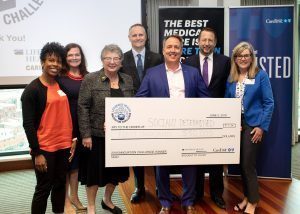
Zynerba’s CBD Drug Shows Promise for Fragile X Syndrome
By Mark Terry
April 18, 2023
In the last five years, a few drugs based on variations of cannabidiol have been approved for therapeutic uses. Cannabidiol (CBD) is a chemical component of the Cannabis sativa plant, better known as marijuana. CBD does not have intoxicating or euphoric effects, and in 2018 the FDA approved GW Pharmaceuticals’ Epidiolex oral solution for the treatment of seizures associated with two severe forms of epilepsy, Lennox-Gastaut syndrome and Draven syndrome, in patients two years of age or older. GW is now owned by Jazz Pharmaceuticals.
Other companies are evaluating CBD for other disorders. On April 12, Devon, Pa.-based Zynerba Pharmaceuticals presented data from its ongoing long-term open label study in Fragile X syndrome (FXS) and presented Phase II data in 22q.
Armando Anido, Chairman and CEO of Zynerba, took time to discuss the results and the company with BioBuzz.
The company was founded in October 2014 as a private company based on technology out of the University of Kentucky School of Pharmacy. “A group of investors had found this asset, which is now Zygel. They were looking for a team of people to come and take it from some of the preclinical work that had been done at Kentucky and then ultimately move it forward and get it into the clinic,” Anido said.
Transdermal delivery had been around for a while, and they felt it would be a different approach to delivering CBD. They took the company public in August 2015 and conducted the first study in humans in late October of 2015 and then through a single ascending dose study to multiple ascending dose studies.

Anido said, “We were following a track that our friends at Jazz were looking at for CBD oral in rare epilepsies. We decided to look at a couple of different things. Because of Jazz/GW’s patent protection, we felt it would be necessary for us to try to get around it in some way. So we started with an epilepsy trial in adults and an osteoarthritis trial in adults.”
The first two trials didn’t hit significance, Anido said. But the Fragile X study, known as FAB-C, which was an open-label trial, “actually showed significant promise and had a dramatic effect on the aberrant behavior checklist for Fragile X, particularly in the social avoidance scores.”
Fragile X syndrome (FXS) is a genetic disorder caused by changes in the gene Fragile X Messenger Ribonucleoprotein 1 (FMR1). FMR1 normally manufactures the FMRP protein that is required for brain development. Fragile X patients do not make this protein. FXS can affect both males and females, but females typically have milder symptoms.
Symptoms of FXS include developmental delays, such as not sitting, walking, or talking at the same time as children the same age, learning disabilities, and social and behavioral problems such as not making eye contact, anxiety, difficulty paying attention, hand flapping, and acting and speaking without thinking. The syndrome is named Fragile X because some people with the disorder appeared to have a segment of their X chromosome broken.
There is no cure for FXS, but the symptoms can be treated. Examples include Lithium carbonate or Neurontin for seizures or mood instability, methylphenidate (Ritalin) and Effexor (venlafaxine) for ADHD, and Prozac or Zoloft for aggression or obsessive-compulsive disorder.
“In essence,” Anido said, “we pivoted to become what we are now, which is an orphan-focused neuropsychiatric biopharmaceutical company.” At this time, he indicates that they have enough cash runway to take the company “through all the milestones that we have, which gets us into mid-year 2024, which is beyond when we expect the data for the RECONNECT clinical trial.”
The data presented in April was from an open label extension trial in FXS. The drug demonstrated ongoing long-term safety and efficacy in children and adolescents with FXS. To date, patients with complete methylation demonstrated clinically meaningful changes in Social Avoidance over 24 months.
The company also has completed a trial of Zygel called the INSPIRE trial on pediatric behavioral and emotional symptoms of 22q11.2 deletion syndrome. This syndrome is the second most common chromosomal disorder after Down syndrome, caused by a tiny missing piece of chromosome 22. The deletion is near the middle of the chromosome. Physical symptoms include palate abnormalities, heart defects, immune dysfunction, and esophageal/GI issues, as well as debilitating neuropsychiatric and behavioral problems, including anxiety.
The company reported early trial data on FXS in September 2017, then went into discussions with the FDA to move into a pivotal Phase III trial. That trial, the CONNECT trial, had a readout in summer of 2020.
Anido said, “It didn’t hit significance, but there was a signal in a group of patients that are completely methylated, that showed significant effects in the social avoidance subscale of the aberrant behavior checklist. So we went to the FDA toward the latter part of 2020 and reviewed the data. We thought that because it’s a rare condition with no approved drugs maybe they would give us a go-ahead. Unfortunately, they said it was intriguing data, but go do it in a prospective randomized trial. So we started the RECONNECT trial, which we are currently enrolling.”
Zynerba expects a readout in the first half of 2024. “The primary endpoint in that trial is the same social avoidance subscale, but it’s only in the completely methylated population, which is where we saw the signal from the CONNECT trial,” Anido said. “So far it’s pretty encouraging.”
Because of symptom similarities between FXS, 22q11.2 deletion syndrome and autism spectrum disorder (ASD), Zynerba is open to the idea of developing the drug for ASD. That would require a significant increase in cash as well as a move outside the rare disease space. At this time, they are focused on FXS and 22q11.2 deletion syndrome.
“We have some data from a few years ago in ASD and we do have an agreement with the FDA on what the pathway is for that,” Anido said. “But based on the financial position of our company, we believe that going down the rare population pathway is more efficient. At some point, ASD could be a very interesting follow-on indication that we would pursue.”
The company is also considering partnerships for the drug outside the U.S., perhaps in Europe, Japan or other countries.
“We think there are other people that could probably do it much better than we can outside the United States, and we could take it and do it ourselves here in the U.S. based on the target rare disease population we’re going after,” Anido notes.
The company has conducted a lot of work to determine what CBD’s mechanism of action is for these indications, and published an article in January in the Journal of Neurodevelopmental Disorders describing it.
Anido said, “It basically shows that it tends to have an effect on the endocannabinoid system. That system is very significantly disrupted in both FSX and 22q11.2 deletion syndrome. And what CBD tends to do is indirectly help bring back the endocannabinoid system towards more normal levels. The endocannabinoid system has an effect on neuronal development and function. These kids end up with severe social avoidance, anxiety and the like. Our drug has shown to have an effect on improving those behavioral symptoms.”
—
CORRECTION: On April 21, 2023 the second paragraph was amended to clarify data details. On May 9, 2023, additional corrections were made to the trial information, namely the date of data readouts and the name of the trial.
- About the Author
- Latest Posts
Mark Terry is a freelance writer, editor, novelist and ghostwriter. He holds a degree in microbiology & public health and spent 18 years in infectious disease research and clinical and research genetics prior to his transition to a writing career. His areas of expertise include biotechnology, pharma, clinical diagnostics, and medical practice management. He has written literally thousands of articles, as well as market research reports, white papers, more than 20 books, and many other written materials. He currently lives in Michigan with his family.




